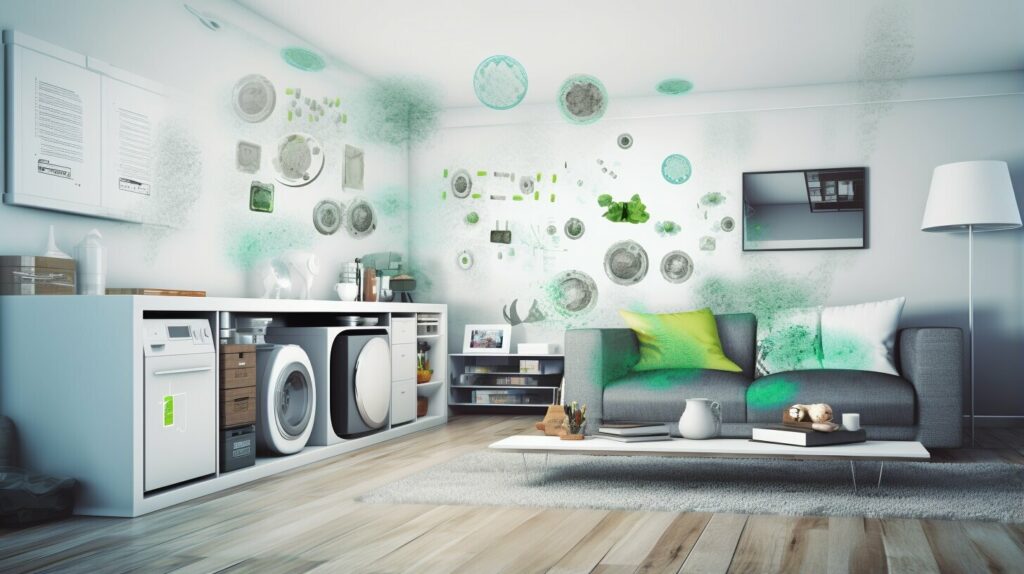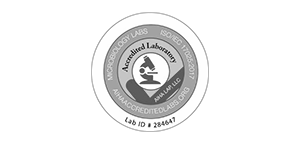
What Kills Mold Spores in the Air?
If you’re concerned about mold spores in the air, you’re not alone. Mold spores are a common problem in many homes and can cause a range of health issues, especially if you have mold spore allergies. Fortunately, there are effective solutions to eliminate mold spores and protect your home and health. In this section, we will discuss different methods of mold spore detection and effective solutions for killing mold spores in the air.
Key Takeaways:
- Mold spores are a common problem in many homes and can cause health issues.
- Effective solutions for killing mold spores can protect your home and health.
- Understanding different methods of mold spore detection is important for effective elimination.
Understanding Mold Spores
If you want to effectively eliminate mold spores from the air, you need to understand what they are and how they can impact your indoor environment. Mold spores are tiny particles that carry mold growth potential and are easily spread through the air. Mold can grow in any indoor environment with enough moisture, and its spores can be present in the air without visible signs of mold growth.
If you want to test for mold spores, you can use a mold spore testing kit that collects samples of the air and surfaces in your home. Once you have collected samples, you can send them to a laboratory for mold spore identification to identify the type of mold spores present in your home and determine the severity of the problem.
The Dangers of Mold Spores
While mold spores are not always harmful, they can pose significant risks to your health. Some common allergic reactions to mold spores include sneezing, coughing, watery eyes, and skin irritation.
In more severe cases, mold spores can trigger asthma attacks, worsen existing respiratory conditions, and cause lung infections. Individuals with weakened immune systems, such as children, elderly, and people with chronic illnesses, are more susceptible to these health risks.
It’s crucial to identify and eliminate mold spores in the air to prevent them from causing harm to your health. If you suspect mold spore allergies or experience any unusual symptoms, it’s crucial to consult a health professional immediately.
Prevention Tips for Mold Spores
Mold spores can easily thrive and grow in a damp and humid environment. Therefore, the key to preventing mold spores is to control the moisture in your home. Here are some tips that can help you keep mold spore levels low:
1. Fix Leaks: Regularly inspect your home for any leaks and fix them immediately. Leaking pipes, roofs, and windows are the most common sources of moisture that can cause mold spores to grow.
2. Clean Regularly: Regular cleaning can help prevent the accumulation of dust, which can contain mold spores. Make sure to clean your home thoroughly at least once a week, especially in areas where moisture tends to accumulate, such as the bathroom and kitchen.
3. Control Humidity: Maintain proper humidity levels in your home by using a dehumidifier, especially in areas with high humidity levels. The ideal humidity level is between 30% and 50%.
4. Improve Ventilation: Proper ventilation can help reduce moisture levels indoors. Make sure to use exhaust fans when cooking or showering and open windows to improve airflow.
5. Monitor Mold Spore Levels: Regularly test the air in your home for mold spore levels, especially if you have a history of mold problems. This can help you detect any mold spore growth early and take action before it becomes a serious problem.
6. Remove Wet or Damaged Materials: Wet or damaged materials such as carpets and wallpaper can easily become a breeding ground for mold spores. Remove any wet or damaged materials immediately to prevent mold growth.
By implementing these prevention tips, you can effectively reduce the risk of mold spores in your home and protect your health.
Natural Remedies to Kill Mold Spores
If you prefer natural solutions for eliminating mold spores, there are many options available. Natural remedies are environmentally-friendly and can effectively kill mold spores in the air. Here are some natural remedies you can use:
Vinegar:
Vinegar is a popular natural solution for killing mold spores. Its acidic properties can break down mold spores and prevent their growth. Mix equal parts white vinegar and water in a spray bottle and apply it to areas with mold growth. Let it sit for an hour before wiping it away with a cloth.
Tea Tree Oil:
Tea tree oil is a natural antifungal and antibacterial agent that can kill mold spores. Mix 10 drops of tea tree oil with a cup of water in a spray bottle and apply it to areas with mold growth. Let it sit for a few hours before wiping it away with a cloth.
Baking Soda:
Baking soda is a natural deodorizer and can help absorb moisture from the air, making it difficult for mold spores to grow. Mix a quarter of a tablespoon of baking soda with a cup of water in a spray bottle and apply it to areas with mold growth. Let it sit for a few hours before wiping it away with a cloth.
Improved Ventilation:
Poor ventilation can lead to high humidity levels, which can promote mold growth. Opening windows and using exhaust fans can improve ventilation and prevent mold spores from circulating in the air.
Control Humidity:
Keep humidity levels below 60% to prevent mold growth. Use dehumidifiers and air conditioners to regulate humidity levels in your home.
Chemical Solutions for Mold Spores
If you are dealing with a severe mold spore problem in the air, chemical solutions might be the most effective option. There are a variety of chemical products available in the market specifically designed to kill mold spores in the air.
One of the most commonly used chemicals for mold spore elimination is bleach. Bleach has strong disinfectant properties and kills most types of mold spores on contact. However, bleach can also be harmful to health and should be used with caution.
Another popular option is hydrogen peroxide. It is a non-toxic and safe alternative to bleach. It can effectively kill mold spores and remove stains caused by mold. Hydrogen peroxide also has a neutralizing effect on musty odors.
There are also other chemical solutions available, such as quaternary ammonium compounds, which are powerful disinfectants that can kill mold spores. However, they should be used with caution and according to the manufacturer’s instructions.
When using chemical solutions to eliminate mold spores, it’s important to take appropriate safety measures. Always wear protective equipment, such as gloves and masks, and ensure proper ventilation in the area where the chemical is being used.
Chemical solutions can be a highly effective way to eliminate mold spores in the air, but they should always be used responsibly and with caution.
Professional Mold Remediation
If you have experienced recurring or extensive mold spore infestations, professional mold remediation might be necessary to ensure complete elimination of airborne mold spores. Hiring experts for mold removal services has several benefits, including the use of advanced equipment and techniques that may not be available to the average homeowner.
Professional mold remediation typically involves a thorough inspection of your property to identify the source of the mold spores and the extent of the damage. The experts may use special equipment such as air scrubbers and dehumidifiers to remove spores from the air and regulate humidity levels to prevent further growth. They may also use specialized cleaning agents to disinfect the affected areas and prevent further mold growth.
One significant benefit of hiring professionals for mold spore removal is that they can detect hidden mold that may be growing behind walls or other hard-to-reach areas. They can also ensure that all mold spores are eliminated and that your indoor air quality is restored to a healthy level.
Professional mold remediation can be expensive, but it’s a worthwhile investment if you have respiratory problems or allergies triggered by mold spores. It’s important to choose a reputable and experienced company that specializes in mold removal and prevention to ensure that the job is done correctly.
Maintaining Mold-Free Air Quality
Congratulations! You have successfully eliminated mold spores from your indoor environment. However, to ensure long-term protection against airborne mold spores, you must maintain proper ventilation and humidity control.
Improving ventilation in your home is essential to remove excess moisture that can lead to mold growth. Make sure to regularly open windows and use exhaust fans in high-moisture areas like bathrooms and kitchens.
Monitoring and controlling humidity levels is also crucial for preventing mold spores from returning. Aim for humidity levels between 30% and 50%. You can use a hygrometer to measure humidity levels and a dehumidifier to remove excess moisture from the air.
Regularly checking for leaks and fixing them promptly can also prevent moisture buildup and mold growth. Additionally, ensure proper drainage and ventilation in your home’s foundation, attic, and crawl spaces.
Lastly, keep indoor areas clean and dry. Regularly dust, vacuum, and mop floors to eliminate potential mold food sources and prevent spores from settling on surfaces.
By following these maintenance tips, you can enjoy mold-free air quality in your home and protect yourself and your loved ones from the potential dangers of indoor mold spores.
FAQ
Q: What kills mold spores in the air?
A: There are several effective solutions for killing mold spores in the air. These include natural remedies, chemical solutions, and professional mold remediation.
Q: What are mold spores and how can I test for them?
A: Mold spores are microscopic particles produced by mold that can become airborne. To test for mold spores, you can use mold spore testing kits or hire professionals to conduct air quality tests.
Q: What are the dangers of mold spores in the air?
A: Mold spores can trigger allergic reactions and respiratory problems, especially for individuals with mold spore allergies. It’s important to understand the potential health risks associated with mold spores in the air.
Q: How can I prevent mold spores in my home?
A: Preventing mold spores involves keeping mold spore levels low, controlling humidity, improving ventilation, and practicing proper mold spore removal methods.
Q: Are there natural remedies to kill mold spores?
A: Yes, there are natural remedies that can effectively eliminate mold spores in the air. Using vinegar, tea tree oil, and improving ventilation are just a few examples.
Q: What are the chemical solutions for mold spores?
A: There are various chemical options available for killing mold spores in the air. These include mold-killing sprays, disinfectants, and fungicides that are specifically designed for mold remediation.
Q: When should I consider professional mold remediation?
A: Professional mold remediation may be necessary if you have extensive or recurring mold spore infestations. Hiring experts ensures complete elimination of mold spores and prevents further contamination.
Q: How can I maintain mold-free air quality?
A: To maintain mold-free air quality, it’s important to prevent mold spore reoccurrence, maintain proper ventilation, control humidity levels, and create a healthy indoor environment. These measures will help protect against airborne mold spores.







